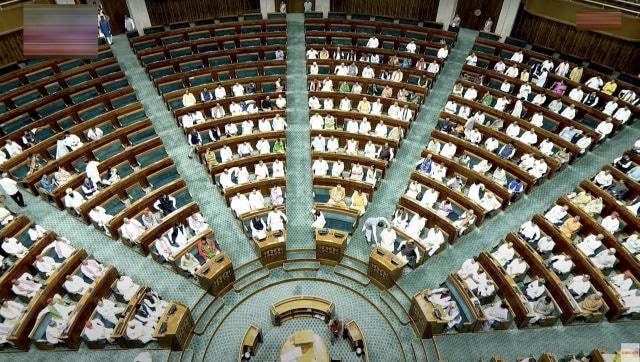After much hype and hoopla, the 18th Lok Sabha finally has a Speaker in Bharatiya Janata Party’s (BJP) Om Birla. The Kota MP beat out the INDI Alliance’s candidate K Suresh through a voice vote, capping intense debate on the issue after the opposition had in a rare move proposed its candidate.
However, the drama in the Lok Sabha is far from over. The opposition, namely the Congress, is gunning for the Deputy Speaker’s position. The
rare election
for the Speaker also was owing to the Grand Old Party demanding that the Centre accede to their demand for the post.
Rahul Gandhi, who is now the
Leader of the Opposition
(LoP), had earlier said that the opposition was willing to support the NDA’s candidate for Speaker provided the government followed the parliamentary convention and gave the Deputy Speaker’s post to the Opposition.
But why is the Deputy Speaker’s post important? And do the rules say that an opposition MP should be holding this position? We explore it all.
Who is the Deputy Speaker? What are her/his functions?
While the Speaker holds the
important position
of being in charge of the Lok Sabha, the Deputy Speaker holds the second highest post in the lower house of Parliament. Like the Speaker, the Deputy Speaker is also elected by MPs of the Lok Sabha.
While the Speaker is elected first, the election for the Deputy Speaker normally takes place in the second session. However, there is no restriction on having it earlier. The election for this position is governed by Rule 8 of the Rules of Procedure and Conduct of Business in Lok Sabha.
According to Rule 8, the election “shall be held on such date as the Speaker may fix”. Once elected, the Deputy Speaker usually continues in office until the dissolution of the House.
Article 94 states that the Speaker or Deputy Speaker “shall vacate his office if he ceases to be a member of the House of the People”. They may also resign (to each other), or “may be removed from office by a resolution of the House of the People passed by a majority of all the then members of the House”.
And what powers does this position hold? Article 95(1) of the Constitution empowers the Deputy Speaker to perform the duties of the Speaker if the post is vacant. The Deputy Speaker has the same general powers as the Speaker when presiding over the House. All references to the “Speaker” in the Rules are deemed to be references to the Deputy Speaker as well for the times when he or she presides.
Similar to the Speaker, his/her deputy also gets to cast the deciding vote if there is a tie during voting within Parliament or between both houses.
Has Lok Sabha not had a Deputy Speaker in the past?
In the history of Independent India, the 17th Lok Sabha (2019-2024) was the first not to have a Deputy Speaker. At the time, reports had stated that the single largest opposition party must have a strength of 56 in order to have a member as the Deputy Speaker. In 2019, the Congress had fared dismally in the general elections, only securing 44 seats.
However, when asked if not having a Deputy Speaker is unconstitutional, experts have referred to Article 93 of the Constitution, which states “The House of the People shall, as soon as may be, choose two members of the House to be respectively Speaker and Deputy Speaker”. Their observation is that with the usage of words such as “shall” and “as soon as may be”, the election for Deputy Speaker is not mandatory.
What about the convention of opposition holding the post?
Since the commencement of this Lok Sabha, the Congress, buoyed by its numbers, has been gunning for the Deputy Speaker position, citing convention. K Suresh, the Congress candidate for the Speaker’s position had said earlier: “Last two Lok Sabhas, they denied us Deputy Speaker’s post because they said you are not recognised as the opposition. Now we are recognised as the opposition, (and) Deputy Speaker post is our right. But they are not ready to give us,” he told reporters.
Even Congress chief, Mallikarjun Kharge, had told Defence Minister Rajnath Singh that the Deputy Speaker should be from the opposition benches.
But has this always been followed? PDT Achary, former Secretary General of Lok Sabha, has said there has been a convention to give the Deputy Speaker’s post to the opposition.
Records also concur with Achary. During the United Progressive Alliance’s first tenure (2004-2009), the Deputy Speaker was with the opposition — Charanjit Singh Atwal of the Shiromani Akali Dal. And in the second UPA regime, the Deputy Speaker was Kariya Munda of the BJP.
During the Atal Bihari Vajpayee government, which spanned two Lok Sabhas — 1998-99 and 1999-2004 — Congress’s PM Sayeed was the Deputy Speaker.
While HD Deve Gowda was the prime minister, the BJP’s Suraj Bhan held the post. Similarly, when PV Narasimha Rao was PM, Mallikarjunaiah of the BJP was Deputy Speaker
In the ’80s, the Congress had offered the post to G Lakshmanan of the Dravida Munnetra Kazagham, which was then an ally of the party.
However, until 1969, the ruling Congress held both posts. It offered the Deputy Speaker position to All Party Hill Leaders Conference’s Gilbert G Swell, then an MP from Shillong. And it was from here that the tradition of offering the Deputy Speaker’s post to an alliance partner or Opposition began.
With inputs from agencies
Link to article –
Why is the Congress demanding the Deputy Speaker’s post in Lok Sabha? What does history reveal?

